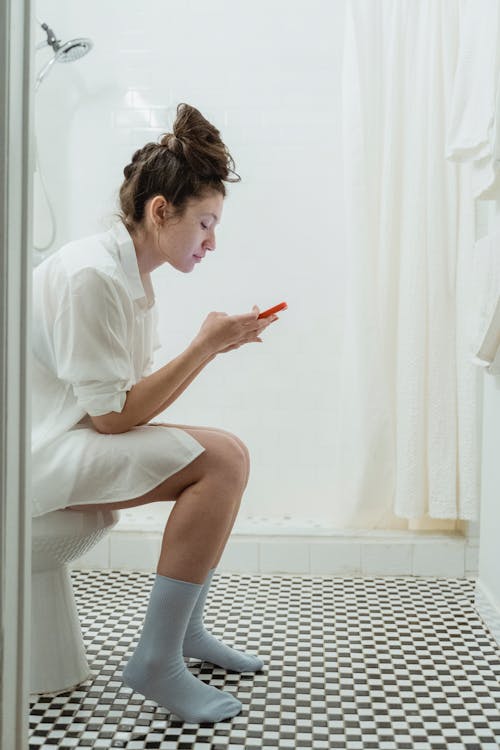What Causes Urine Leakage After Using
the Bathroom?
Why Do I Experience Urine Leakage After Using the Toilet?
If you find yourself experiencing urine leakage after using the toilet, you're not alone. This type of urinary incontinence, often referred to as "after-dribble" or overflow incontinence, affects approximately 30 percent of women. It may feel like your bladder is not fully emptying, and you might notice a small amount of urine leakage after you think you've finished urinating. While urinary incontinence can occur in anyone, it is more common in older individuals, pregnant women, and those who have given birth. Dealing with bladder control issues can be embarrassing and may lead to avoiding regular activities. However, incontinence can often be managed or treated effectively.
Is it normal to experience urine leakage after using the toilet?
While urine leakage after using the toilet is not considered normal, urinary incontinence can have various causes unrelated to underlying diseases. It can occur temporarily due to factors such as alcohol consumption, lack of access to bathrooms, coughing, sneezing, extreme anxiety, or intense laughter.
Causes of urine leakage:
Urinary incontinence can stem from everyday habits, underlying medical conditions, or physical problems. A comprehensive evaluation by a healthcare professional can help determine the underlying cause of your incontinence.
Some instances of urine leakage can be attributed to temporary and controllable factors. Certain beverages, foods, and medications may act as diuretics, stimulating the bladder and increasing urine volume. These include alcohol, caffeine, carbonated drinks, artificial sweeteners, chocolate, chili peppers, spicy, sugary or acidic foods, and certain medications like heart and blood pressure medications, sedatives, muscle relaxants, and large doses of vitamin C.
Urinary incontinence can also be caused by treatable medical conditions, such as urinary tract infections that irritate the bladder, leading to strong urges to urinate and occasional incontinence. Additionally, constipation with hardened stool in the rectum can activate the nerves shared with the bladder, resulting in increased urinary frequency.
Persistent urinary incontinence may be caused by underlying physical problems or changes, including hormonal changes during pregnancy, weakened pelvic floor muscles and damaged bladder nerves and tissue due to vaginal childbirth, age-related decline in bladder muscle function and increased involuntary bladder contractions, decreased estrogen levels after menopause, tumors or urinary stones blocking normal urine flow, and neurological conditions like multiple sclerosis, Parkinson's disease, stroke, brain tumors, or spinal injuries affecting bladder control nerve signals.
By identifying the underlying cause of urine leakage and seeking appropriate treatment or management options, it is possible to address and improve urinary incontinence symptoms.
How Can I Prevent Urine Leakage After Using the Toilet?
There are various medical treatments available to address urinary leakage after urination. Here are four common solutions that your doctor may recommend:
Medications: Certain medications can help improve bladder function, increase bladder capacity, reduce urgency, and enhance the ability to fully empty the bladder.
Botox: Injection of Botox into the bladder lining can help prevent urine leakage by relaxing the muscles and reducing overactivity.
Urethral injections: Supportive injections near the urethra can provide additional support and help prevent leakage.
Bladder sling surgery: In some cases, a bladder sling surgery may be recommended. This procedure involves placing a mesh sling under or around the urethra to provide support and prevent leakage.
Tips for managing urine leakage:
If you prefer to explore non-medical options to manage urine leakage after urination, here are some tactics you can try:
Dietary adjustments: Avoiding certain foods, drinks, and ingredients known to irritate the bladder can help reduce leakage. These may include alcohol, artificial sweeteners, caffeine, carbonated beverages, chocolate, citrus fruits, tomatoes, corn syrup, and spicy foods.
Weight management: Losing weight can help alleviate symptoms of bladder leakage, as excess weight puts additional pressure on the bladder and pelvic floor muscles.
Pelvic floor exercises: Performing exercises like Kegels can strengthen the pelvic floor muscles and improve bladder control. The Knack method involves contracting the pelvic floor muscles during activities that trigger leakage, such as coughing or sneezing.
Leak-proof protective underwear: Using leak-proof protective underwear, such as Beautikini Leakproof Underwear, can provide an extra layer of protection and keep you dry and comfortable throughout the day.
Can urine leakage be cured?
In the majority of cases, urinary leakage can be cured or significantly improved through various treatments and management strategies. Seeking medical advice and exploring appropriate options can help address the underlying causes and alleviate symptoms.
What are the consequences of untreated bladder incontinence?
If left untreated, urinary incontinence can have a negative impact on daily life, leading to sleep disturbances, depression, anxiety, and a loss of interest in sexual activities. If your condition is affecting your quality of life, it is advisable to consult your doctor, who may refer you to a pelvic floor specialist or urologist.
When should you schedule an appointment with a doctor?
If urine leakage causes embarrassment and leads you to avoid important activities, it is advisable to consult your primary care provider. Seek medical attention if you frequently experience a strong urge to urinate and frequently rush to the bathroom but occasionally cannot make it in time. Additionally, if you frequently feel the need to urinate but have difficulty passing urine, it is recommended to see a doctor. These symptoms may indicate an underlying issue that requires medical evaluation and appropriate treatment.
Purchase Beautikini Leakproof Underwear for a comfortable and dry experience, eliminating the unpleasant feeling of wet undergarments. While discussing long-term solutions with your doctor, consider shopping for Beautikini Leakproof Underwear to ensure round-the-clock dryness and comfort. Avoid the discomfort of wet underwear and explore this reliable option for enhanced confidence and peace of mind.










